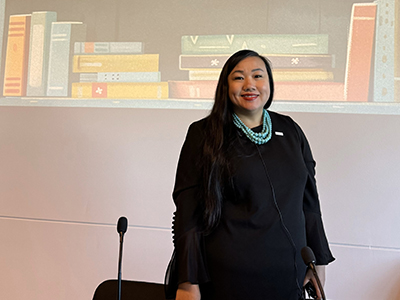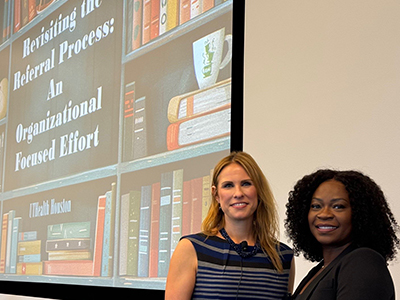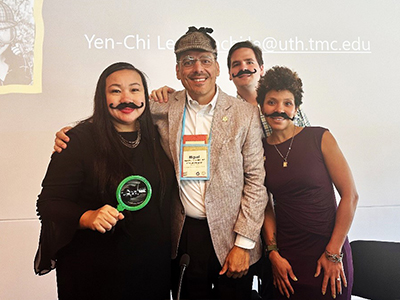UTHealth Houston left an indelible mark at the Epic UGM 2024 (Users Group Meeting) conference in August, showcasing on stage the university’s impressive progress and growing expertise in health care analytics. This prestigious annual event, held at Epic’s Wisconsin headquarters, attracted more than 7,000 health care leaders and IT experts.
“Our strong showing underscores our institution’s dedication to advancing patient care through technology,” said Babatope Fatuyi, MD, chief medical information officer at UTHealth Houston. “This gathering provides an important platform for sharing ideas and learning about the latest developments in electronic health records.”
The following provides a glimpse of the five sessions UTHealth Houston led throughout the conference.
Optimizing charge capture with physician champions
Presenters: Brian Heaps, MD; Martin J. Citardi, MD; Miguel Rodriguez, MBA, PMP; Sharay Zeitz

UTHealth Houston shared its journey for developing its charge capture policy. This included collaborative strategies to enhance physician charge capture and partnerships with physician champions. Collaboration with various department leaders and work groups plays a pivotal role in driving organizational change, according to Martin J. Citardi, MD, vice dean of clinical technology.
“Efficient and timely charge capture is a priority to minimize time spent on this routine task,” Citardi said. “Beyond this, we illustrate our shared governance through stakeholders who come together to optimize our system so we can deliver on our central mission of care delivery.”
Citardi said the governance model has been important to UTHealth Houston’s EHR success, and UTHealth Houston wanted to share that model with peer organizations.
Campaigns strategy and governance
Presenter: Yen-Chi Le, PhD

UTHealth Houston shared the stage with Henry Ford Health as part of a panel.
As technology evolves, it’s critical to share success stories and lessons learned as best practices for others. UT Physicians is considered an early adopter of Campaigns, with its first in late 2021 during the COVID-19 pandemic. In the last three years, health care has struggled with physician/nurse burnout and patients delaying preventive health services.
“These lags in preventive care and health care burnout/shortages forced organizations to innovate regarding patient outreach and education,” said Yen-Chi Le, PhD, executive director of innovation & quality in the Healthcare Transformation Initiatives (HTI) department at UTHealth Houston.
This is a timely topic for the university to share on the UGM stage because there is no need to reinvent the wheel. Le said UT Physicians has created workflows and documentation templates that other organizations can adopt. “Campaigns is a wonderful tool that makes mass patient outreach possible and cost-effective,” Le said. “Several of our active Campaigns save hundreds of hours of manual labor each month for appointment scheduling and phone calls.”
Enhancing healthcare education by introducing Epic to medical, nursing, and informatics students
Presenters: Aisha Ahmed, MEd; Angela Ross, DNP, MPH, RN; Diane Santa Maria, DrPH, MSN, RN; Miguel Rodriguez, MBA, PMP

UTHealth Houston showcased how integrating Epic into health care education revolutionizes how the university prepares future health care professionals. One year into the process, the team garnered insights from the pilot phase to plan strategies for the future.
“Sharing Epic’s impact on health care education is crucial because it demonstrates how integration can significantly enhance educational experiences and better prepare students for the modern, interprofessional health care landscape,” said Aisha Ahmed, MEd, assistant director of enterprise Epic training and technology at UTHealth Houston.
The session demonstrated how medical, nursing, and informatics students can collaborate using shared simulation profiles within Epic. By presenting the university’s foundational approach to EHR education to other organizations and schools, the team hopes to encourage them to adopt similar methods.
“People think they’re doing this, but they can enhance how sophisticated this can get and what it can mean for the learner,” said Diane Santa Maria, DrPH, MSN, ACRN, PHNA-BC, the Jane and Robert Cizik Distinguished Chair and Huffington Foundation Endowed Chair in Nursing Education Leadership and dean at Cizik School of Nursing. “Finding a way to tell that story is impactful. UTHealth Houston is leading the way.”
This topic underscores a key initiative: fostering interprofessional education. Ahmed said the approach helps students understand how different health care disciplines are interconnected in patient care and outcomes.
Revisiting the referral process: An organizational focused effort
Presenters: Lindy Anderson-Papke, MHA; Stephanie Dixon, MBA

UT Physicians wanted to implement cross-departmental scheduling within Epic, but it required focusing on its referral backlog and processes. Lindy Anderson-Papke, MHA, executive director of clinic operations performance improvement at UT Physicians, said working referrals for care in a timely manner instills patient confidence.
“This increases their loyalty and faith in UT Physicians as the right practice for them,” Anderson-Papke said. “We are uniquely positioned to care for many aspects of a patient’s health care journey, with more than 80 specialties and subspecialties.”
The session described how the university formed a work group to determine the current state, deployed process improvements, and monitored them with key performance indicators. The numbers are compelling. UT Physicians decreased the referral work queue volume by more than 60%, doubling the volume of referrals scheduled through cross-departmental scheduling.
“We’ve made substantial progress in refining our referral management workflows, yet we acknowledge this is only the beginning,” said Stephanie Dixon, MBA, manager of project management operations at UT Physicians. “Continuous improvements are in the works to further optimize patient scheduling and improve patient access channels.”
Innovation through inclusion: Empowering citizen developers to fuel analytics
Presenters: Miguel Rodriguez, MBA, PMP; Sandra Stansberry, MPH; Yen-Chi Le, PhD

A growing demand for customized data led to the creation of UTHealth Houston’s tiered Community Report Builders (CRBs). This collaborative framework aligns with Epic’s vision of empowering users as citizen developers.
“This session goes beyond sharing a success story and aims to inspire others to rethink their approach to analytics and data-driven decision-making in health care,” said Miguel Rodriguez, MBA, PMP, senior director of healthcare IT analytics and training, UTHealth Houston. “Presenting the success of this model at UGM positions UTHealth Houston as a leader in health care analytics, enhancing the institution’s reputation and influence.”
Sandra Stansberry, MPH, director of innovation and analytics in the Healthcare Transformation Initiatives (HTI) department at UTHealth Houston, proudly showcased the team’s innovations and accomplishments.
“UTHealth Houston’s embrace of a distributed model of analytics has paved the way for these types of innovations,” Stansberry said. “It’s incredibly rewarding to discuss how this approach has benefited our institution. I hope our session can serve as a roadmap for others looking to achieve similar successes.”
By sharing advancements and successes throughout the UGM conference, UTHealth Houston highlighted its dedication to excellence and inspired others to strive for continuous improvement. Together, they can shape the future of health care.




